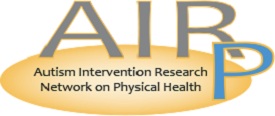
AIR-P (MGH-scheduled to sunset)
The AIR-P (MGH-scheduled to sunset), is led by Karen Kuhlthau, PhD. The key goals for the AIR-P Network from 2015 to 2020 were two-fold: To conduct multi-site research on evidence-based interventions that improve physical health of children and adolescents with ASD and developmental disorders, especially underserved populations. To transform AIR-P into a multi-site Autism Learning Health Network (ALHN) which will provide a collaborative laboratory for developing and testing evidence-based interventions and accelerating the adoption of effective interventions and system management approaches into practice.
Read More >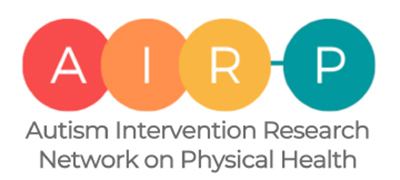
AIR-P (UCLA-initiated 9/1/20) Updates
n September 2020, the University of California, Los Angeles (UCLA) had the opportunity to assume leadership of the Autism Intervention Research Network on Physical Health (AIR-P) programming and activities under the direction of Dr. Alice Kuo. Funded by the Maternal and Child Health Bureau, Health Resources and Services Administration, the AIR-P is an interdisciplinary, multicenter research network for scientific collaboration and infrastructure to increase the life expectancy and quality of life for autistic individuals, with a focus on underserved/vulnerable populations. The AIR-P supports innovative life course intervention research in six areas (Research Nodes): (1) primary care services and quality, (2) community-based lifestyle interventions, (3) gender, sexuality, and reproductive health, (4) health services and systems, (5) neurology, and (6) genetics.
Read More >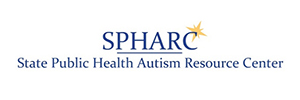
Updates from the State Public Health Autism Resource Center
2021 has arrived! Despite the challenges we have all faced during COVID-19, our Community of Learners have persevered and made excellent progress in their work. Most notably, the Iowa team successfully hosted the 2020 Virtual Peer to Peer exchange in the midst of a severe derecho. The theme for P2P was The Iowa Family Navigator Model: Providing Family-to-Family Support to Families of Children and Youth with ASD/DD. The virtual event took place over three days and was filled with engaging workshops and inspiring panel discussions with family leaders. Participants included the current grantees from North Carolina, Tennessee, Virginia, and Wisconsin, as well as former grantees from Delaware, Minnesota, Rhode Island, and Virginia.
Read More >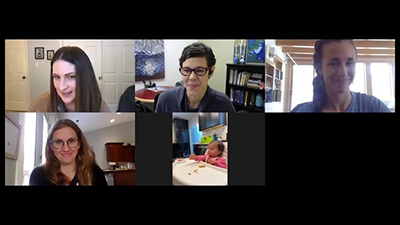
The Alaska LEND Without Walls is a program that has embraced video teleconferencing as a method to reach faculty and fellows across the geographically vast state. During the current pandemic, the Alaska LEND program utilized a virtual environment for all activities. As part of the annual fall semester "face to face" seminar, interdisciplinary faculty and fellows participate in a mock developmental assessment.
Read More >
As a relatively new LEND program (entering our 4th year), we have not focused on engaging alumni to this point. However, our alumni have expressed an interest in remaining connected to the NJLEND program and each other, and in continuing to receive updates and information about educational opportunities we routinely share with our current NJLEND Fellows. We propose to use this funding opportunity to learn more about this expressed need, and to implement strategies that help our former Fellows sustain meaningful engagement with each other and with on-going LEND program activities. Additionally, several of the strategies we plan to implement will benefit the NJLEND program and the maternal and child health workforce by enriching the curriculum as well as the clinical and experiential opportunities available to our Fellows and providing an avenue to address MCH emerging issues with those who have already graduated. Eventually, we expect that focusing on engagement early will help sustain a very high rate of trainee follow-up survey completion at the 5 and 10 year intervals.
Read More >
Engaging and leveraging the alumni network is a key priority area for the New Mexico Leadership Education in Neurodevelopmental and Related Disabilities (NM LEND) program. As a network, former trainees have the potential to positively impact systems of care through advocacy, research, and service delivery to a far greater degree than working as individuals in this sparsely populated state. At this time, a small percentage of former trainees are invited to contribute to LEND seminar activities, including participating in panel discussions and presenting didactics. In addition, the NM Center for Development and Disability UCEDD has hired more than twenty former trainees to work in clinical services, conduct research and provide training and technical assistance. Despite these efforts, there is no formal process to create, engage and leverage the statewide network of leaders who are committed to Maternal Child Health (MCH) values and competencies. Creating the NM Engaging and Leveraging Alumni Network project will specifically address this area of need in a key priority area for the NM LEND program.
Read More >
NOTE (1-31-2020): Since this resource was published, trainee surveys have been revised to a 2, 5, and 10 year timeline. The tips provided here are otherwise still pertinent.
Read More >
We wanted a stronger curriculum around the development of research and leadership capstone projects. We developed a stronger, more systematic curriculum that addressed the varied needs of trainees with highly different levels of experience related to research and project development.
Read More >
This project allowed Va‐LEND and UVA to establish a partnership that encouraged a trainee exchange that will continue beyond the time and scope of the FAST grant funding. It allowed for trainees from both programs to take advantage of the strengths of each program: UVA - interdisciplinary clinics and Va‐LEND ‐ disability policy opportunities. The collaboration between these 2 entities were taken one step further with the exploration of clinical training resources and opportunities in rural, Southwest Virginia.
Read More >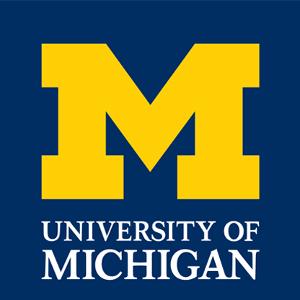
There is a shortage of providers trained to meet the needs of children and teens with mental health conditions and other disabilities in the state of Michigan and nationally. The University of Michigan (UM) has partnered with the Leadership Education in Neurodevelopmental & Related Disabilities program in our state (MI-LEND) to support the education and clinical experiences of learners as they advance through this training. In order to expand the reach of MI-LEND educational experiences at UM and better support the curriculum engaging medium and short-term MI-LEND learners, further development of the curriculum and resources that can serve these learners in the UM area is needed.
Read More >